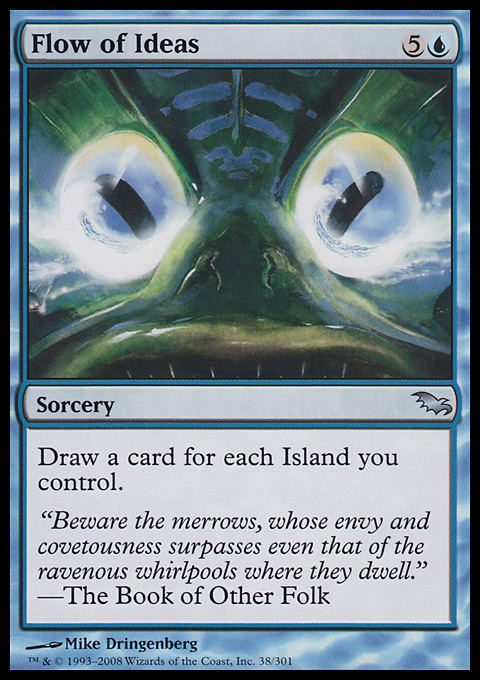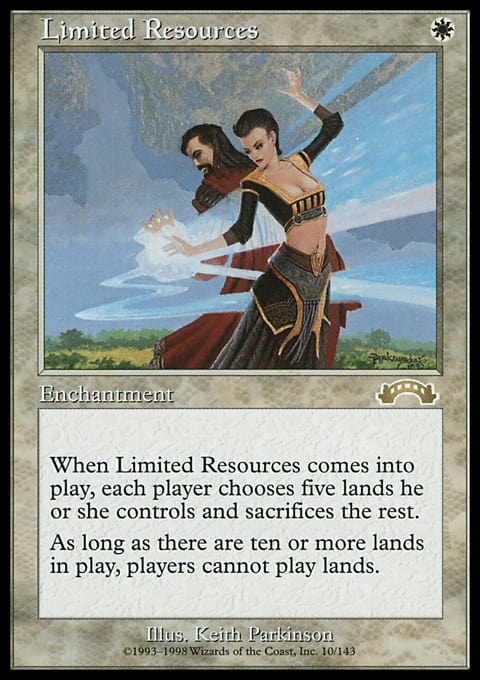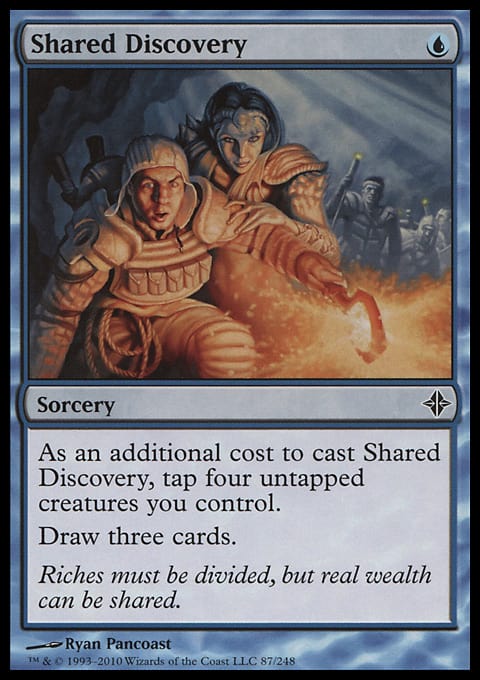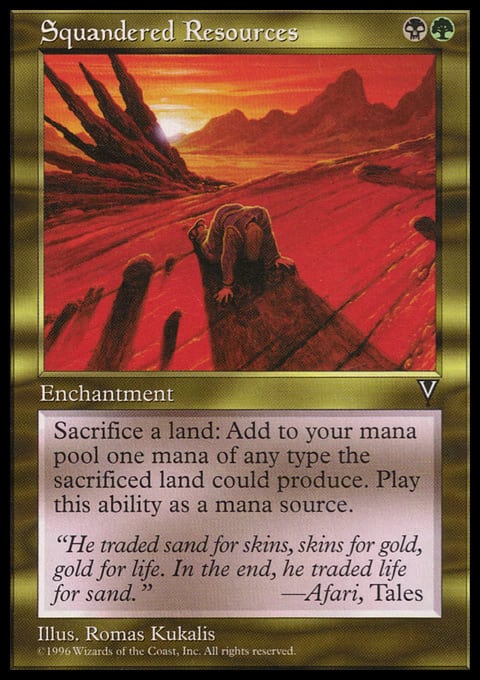It is a rare occurrence where I can talk about the subject du jour of the wider Magic audience and still have it be relevant to Pauper. I am talking about the recent decision to reduce the number of posted decks from the Magic Online leagues from ten decks a day to five. There have been many opinions pieces posted about this and I am adding my voice to the ranks of the dissatisfied. Pauper bears the brunt of this edict in a unique way since unlike almost every other format available on Magic Online, Pauper is lacking a real world analogue that mirrors the digital offering.
But first I want to focus on the announcement at large. The stated purpose of this change is to help slow down the ”solving” of metagames. A solved metagame is one where the best deck is blatantly obvious and there is little ”play”, that is there is a clearly correct choice and all other options are somehow less. This is not a good thing as it takes one of the joys of Magic — deck selection — and makes it secondary. It is not that every style of play should be viable at all times but at different times over the course of a few seasons multiple archetypes should have their day in the sun. Sure, you might not be able to play an aggressive Red deck every season but once every two years it should be viable. The same should be true for reactive control decks, graveyard synergy decks, and almost everything else under the sun.
As Magic grows in popularity, so too does the number of people attempting to break a format. Winning is always going to be awesome and players are going to be striving to find a way to gain edges. The amount of data being generated is growing as is the consumption of the data. Decklists are collected to ensure legality, but one of the best parts of a tournament denouement is the exploration of the lists that almost made it, seeing what technology resides below the surface. The discovery of what could be the next big thing is a joy unto itself.
The change with Magic Online League lists does little to stop the mass generation and dissection of data. Instead it just places a greater emphasis on paper tournaments. Instead, what the change does is it allows for a sense of false diversity. You see there is an insidious rider in the announcement that says decks must be at least ten cards different from each other. So instead of seeing a representative sample of decks we are given five ostensibly different archetypes. It does not matter if a deck is the most popular in a league — it can show up a maximum of one time.
A Pauper corollary to this point: the first three leagues that posted after this change all included Burn. Looking at these a new player could be under the false impression that Burn hovers around 20% of the metagame. In Amonkhet season it was well under 3% of the total winner’s metagame. Yet this new player does not have that information. Instead they are fed bad information and may make decisions based upon said bad information. As the saying goes, garbage in, garbage out. Will this player have an improved experience since it was harder to solve the metagame? Doubtful.
The elephant in the room, if you consider Twitter a room, is Standard. Standard has, from an outsider’s perspective, taken a beating in a past few years. The shift to the Two-Set Paradigm (with 18 month rotation) and the elimination of Core Sets back to a two-year rotation has led to an alarming number of bans in a short period of time. This may have to do with the unintended consequences of the Core Set fail safe, where valuable answers could be printed without the auspices of flavor. It may also have to deal with the fact that sets were designed only to be legal for a year and a half rather than two years, meaning that oppressive strategies would stick around for less time.
Standard has seen incredibly powerful cards dominate and strategies find their tier quickly. Saheeli Rai/Felidar Guardian and Aetherworks Marvel are the two most recent examples, but lest we forget Reflector Mage, Smuggler's Copter, and Emrakul, the Promised End were also banned in the last calendar year. The best decks were discovered early, for better or worse, and it was known. Hiding the data would not have changed this, instead it would have hidden how bad the problem was from a very public forum.
My issue, again as an observer, is not with how data is collected and distributed, and definitely now with how the data is generated. The issue is core to Standard itself. Despite the best efforts of Wizards (and make no mistake they are doing an amazing job) the Standard structure since the introduction of the Two-Set Paradigm cannot stand up to the iteration of such a large mass of players. I do believe that the new release structure, complete with Core Sets, alongside the work of Play Design, will help Standard achieve a better sense of balance. But the problem remains that this data reduction decision hurts other, non-rotating formats.
I am going to focus on Pauper here as other non-rotating formats have results from paper events. Modern, Legacy, and Vintage all have adherents and tournaments played under the same rule structure. While the reduction in results hurt these communities there are still other sources of data. Pauper is not so lucky. While there are events at brick and mortar locations many are operated with a slightly different rule set. If High Tide and Goblin Grenade are legal, is it really the same format played on Magic Online? The answer is a resounding no.
Non-rotating formats are, for the most part, solved. No reduction in data presented is going to change that. As formats grow the cream rises to the top and as such newer cards have to be incredibly powerful (or fit a specific need) to have an appreciable impact. Reducing the data available does not change this fact for non-Standard events. Instead it simply masks the issue. As mentioned before with Burn, Pauper, at the league level, is dominated by Stompy, Izzet Delver, and Affinity. Not far behind these decks is Mono-Blue Delver which may at times have fewer than ten cards different than its ![]()
![]() cousin. So will these results be representative? Over enough time yes but at a glance it is going to be hard to suss out what is going on.
cousin. So will these results be representative? Over enough time yes but at a glance it is going to be hard to suss out what is going on.
This is also an awkward directive for non-rotating formats which have access to functional reprints. Want to play Essence Scatter in Pauper? You can, or you can play Remove Soul or False Summoning. There are enough such cards, ones where the functions are similar enough as to not lose any real equity in a game, that swapping them for each other in the hope of hitting 5-0 and thereby increasing your chances of being showcased is a real factor. Such an occurrence would not showcase format diversity; it displays a person gaming the system.
The decision also makes Pauper a less accessible format. A common misconception of Pauper is that because it is comprised entirely of commons it is somehow underpowered. The league results provided evidence to the contrary. With fewer lists posted, not only is the on-ram steeper, but it is also obscured. Now, if someone wants to look for a deck that reflects their play style, they may have to wait twice as long in order to see such a list. None of this is good.
Magic is a game of hidden information. But it is also a game of trying to understand that which is withheld. The decision to obfuscate data is not, in my opinion, in the game’s best interest. While it may have the desired effect of helping to hold up Standard it does a disservice to formats where cards only leave via ban.
Director of R&D Aaron Forsythe once said “Tech is to be guarded for months, and then unleashed upon scores of hapless players in a scourge like a biochemical bomb. If tech was free, it wouldn't damn well be tech. And tournament Magic wouldn't be nearly as intense.” This was before the pervasive internet. In the world of the Magic Online Panopticon, we need to rethink the nature of tech and data. Information is harder to hide and hiding it is not a panacea. Hoarding data will not erase the problem, it just makes losing to the mistake worse.


























